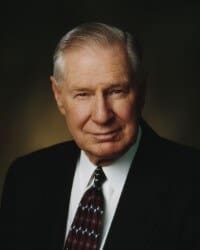
“There need to be some absolutes in life. There are some things that should never be done, some lines that should never be crossed, vows that should never be broken, words that should never be spoken, and thoughts that should never be entertained.”

“There need to be some absolutes in life. There are some things that should never be done, some lines that should never be crossed, vows that should never be broken, words that should never be spoken, and thoughts that should never be entertained.”

“Here then is a great truth. In the pain, the agony, and the heroic endeavors of life, we pass through a refiner’s fire, and the insignificant and the unimportant in our lives can melt away like dross and make our faith bright, intact, and strong. In this way the divine image can be mirrored from the soul. It is part of the purging toll exacted of some to become acquainted with God. In the agonies of life, we seem to listen better to the faint, godly whisperings of the Divine Shepherd.
“Into every life there come the painful, despairing days of adversity and buffeting. There seems to be a full measure of anguish, sorrow, and often heartbreak for everyone, including those who earnestly seek to do right and be faithful. … In this way the soul can become like soft clay in the hands of the Master.”
| The Refiner's Fire, Ensign, May 1979, 53

“What is the central characteristic of those having only five loaves and two fishes? What makes it possible, under the Master’s touch, for them to serve, lift, and bless so that they touch for good the lives of hundreds, even thousands? After a lifetime of dealing in the affairs of men and women, I believe it is the ability to overcome personal ego and pride – both are enemies to the full enjoyment of the Spirit of God and walking humbly before him. The ego interferes with husbands and wives asking each other for forgiveness. It prevents the enjoyment of the full sweetness of a higher love. The ego often prevents parents and children from fully understanding each other. The ego enlarges our feelings of self-importance and worth. It blinds us to reality. Pride keeps us from confessing our sins and shortcomings to the Lord and working out our repentance.”
| Ensign, May 1994, p. 6

“Tithing is a principle that is fundamental to the personal happiness and well-being of the Church members worldwide, both rich and poor. Tithing is a principle of sacrifice and a key to the opening of the windows of heaven.”
| “Opening the Windows of Heaven,” Ensign, Nov. 1998, 59.

In our time God has recognized our intelligence by not requiring endless restrictions. Perhaps this was done with a hope that we would catch more of the spirit of Sabbath worship rather than the letter thereof. In our day, however, this pendulum of Sabbath day desecration has swung very far indeed. We stand in jeopardy of losing great blessings promised. After all, it is a test by which the Lord seeks to “prove you in all things” (D&C 98:14) to see if your devotion is complete.
| Ensign, November 1991, p. 35

“A grateful heart is a beginning of greatness. It is an expression of humility. It helps us develop such virtues as prayer, faith, courage, contentment, happiness, love and well-being. Said the Lord, ‘And he who receiveth all things with thankfulness shall be made glorious; and the things of this earth shall be added unto him, even an hundred fold, yea, more’ (D&C 78:19).”
| "Grateful Heart"

“What we call self-mastery is the necessary price for the things upon which our hearts are set.”

“There is no greater good in all the world than motherhood. The influence of a mother in the lives of her children is beyond calculation.”

“The first has to do with the physical need for rest and renewing. Obviously God, who created us, would know more than we do of the limits of our physical and nervous energy and strength. The second . . . is, in my opinion, of far greater significance. It has to do with the need for regeneration and the strengthening of our spiritual being. God knows that, left completely to our own devices without regular reminders of our spiritual needs, many would degenerate into the preoccupation of satisfying earthly desires and appetites. This need for physical, mental, and spiritual regeneration is met in large measure by faithful observance of the Sabbath day.”
| “The Lord’s Day,” Ensign, November 1991, 35.

“Religion without morality, professions of godliness without charity, church-membership without adequate responsibility as to individual conduct in daily life, are but as sounding brass and tinkling cymbals. … ‘Pure religion and undefiled before God and the Father is this, To visit the fatherless and widows in their affliction, and to keep himself unspotted from the world.’ Honesty of purpose, integrity of soul, individual purity, [absolute] freedom of conscience, willingness to do good to all men even enemies, pure benevolence—these are some of the fruits by which the religion of Christ may be known, far exceeding in importance and value the promulgation of dogmas and the enunciation of theories.”
| Articles of Faith